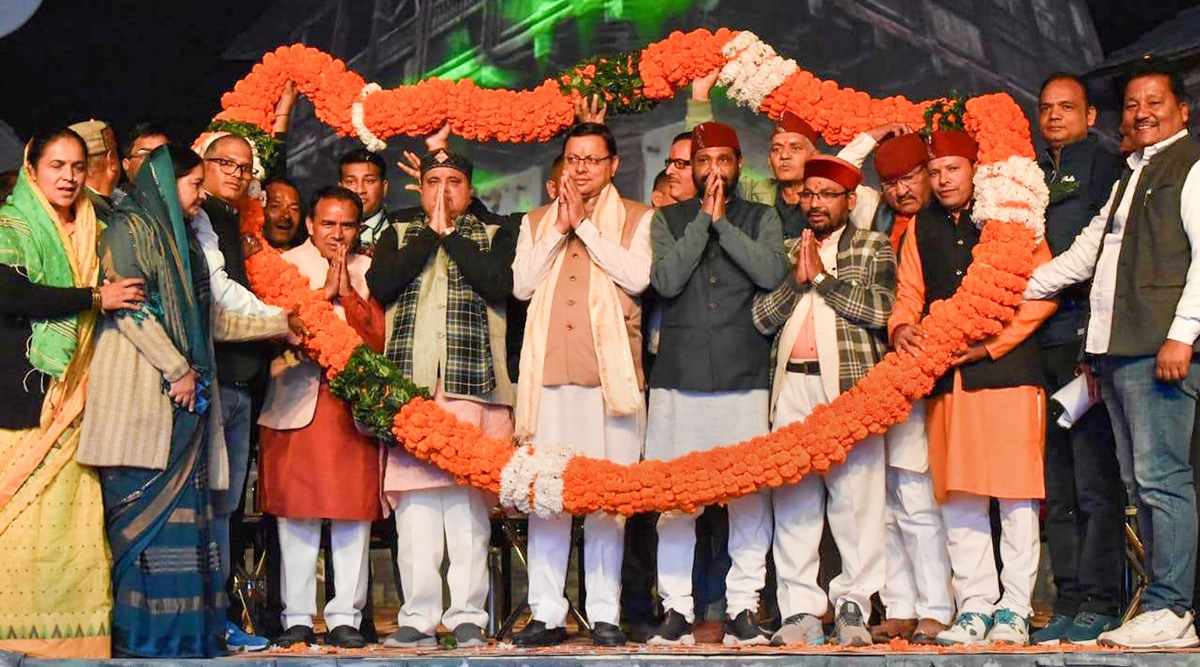Stay updated with the latest - Click here to follow us on Instagram
Uttarakhand moves to make anti-conversion law stronger
Cabinet clears amendment to make it cognizable offence with 10-yr jail term

The Uttarakhand Cabinet on Wednesday cleared a proposal to make the state’s anti-conversion law — Uttarakhand Freedom of Religion Act — stronger with an amendment to make forced conversion a cognizable offence with a provision of 10-year imprisonment, like the law in neighbouring Uttar Pradesh.
The state government also reached an informal consensus on the proposal to shift Uttarakhand High Court from Nainital to Haldwani.
The decisions were taken at a Cabinet meeting chaired by Chief Minister Pushkar Singh Dhami. More than 20 such proposals were passed in the meeting.
“Uttarakhand Freedom of Religion Act, 2018, was passed with an intention to equally strengthen the importance of every religion in the state under the right to freedom of religion given by Articles 25, 26, 27 and 28. Under the current, changed circumstances, and to strengthen the law, Uttarakhand Freedom of Religion (Amendment) Act, 2022, is being passed by the Cabinet,” a source in the government said.
State minister Subodh Uniyal told The Indian Express that with the amendment, forced conversion will be a cognizable offence “with provision of 10 years of punishment”. He said, “We are making laws stricter than that in Uttar Pradesh… A ‘saidhantik sahmati’ (agreed in principle) has also been reached on the proposal to shift Uttarakhand High Court from Nainital to Haldwani.”
A legislation will soon be brought in the state Assembly introducing the amendments in the anti-conversion law, sources said. The Assembly session starts on November 29.
The 2018 state anti-conversion law stipulates a prison term of up to five years for anyone convicted of “forced or fraudulent” conversion.
In November 2020, UP Governor Anandiben Patel had promulgated the ordinance against “forced” or “fraudulent” religious conversions. The ordinance became an Act in March 2021.
The Uttar Pradesh Prohibition of Unlawful Conversion of Religion Ordinance, 2020, provides for a jail term of up to 10 years for any violation. All offences under the ordinance shall be cognizable, non-bailable and triable by the court of sessions, it says.
In Wednesday’s meeting, the Cabinet also decided to provide 2,000 sq ft land for free to BSNL to set up mobile phone towers for 4G connectivity in rural areas. The Cabinet also passed the Rehabilitation and Resettlement Policy for Jamrani Multipurpose Dam, 2022, under which 1,323 families from three villages will be compensated for being affected by the project.
Meanwhile, the ruling BJP in the state welcomed the amendment to make the anti-conversion law stronger. Calling it a decision according to people’s wish, state BJP president Mahendra Bhatt thanked the Chief Minister and said that the step will become a milestone in curbing forced conversion in the state.
The party also welcomed the decision to shift the High Court from Nainital to Haldwani and rehabilitation of Jamrani dam victims.
Neighbourhood inspiration
The Uttarakhand government appears to be taking a leaf out of Yogi Adityanath’s model of ‘strong’ governance in neighbouring Uttar Pradesh. While the Uttarakhand Freedom of Religion (Amendment) Act on the lines of the UP law is the most recent example, in September the Pushkar Dhami government suggested that it plans to carry out the practice to survey unrecognised madrassas in the state — just days after UP announced a similar survey. The new state Waqf board president has recently proposed that the board will buy its own bulldozers to free Waqf properties from illegal possession and encroachment, a la UP.